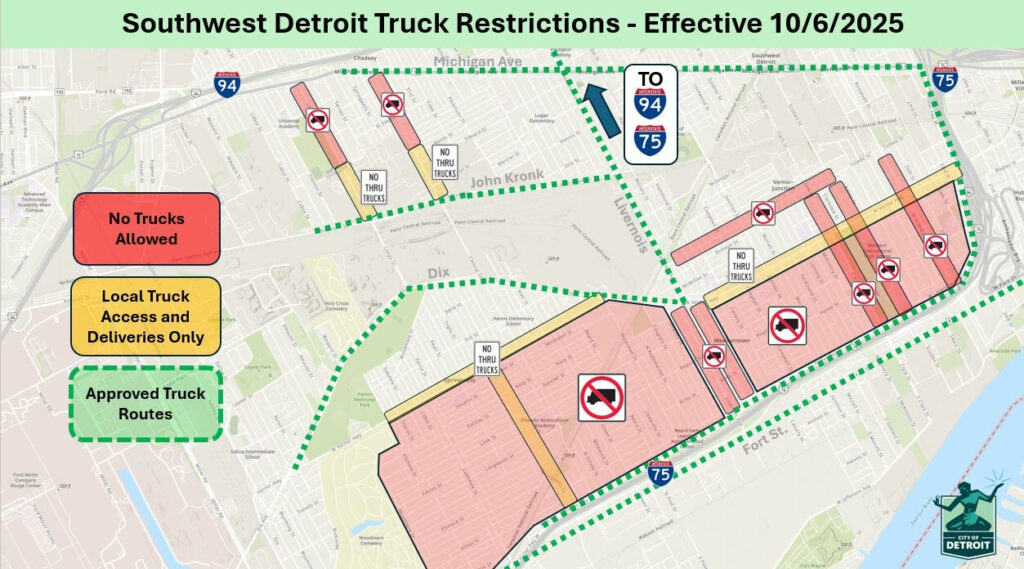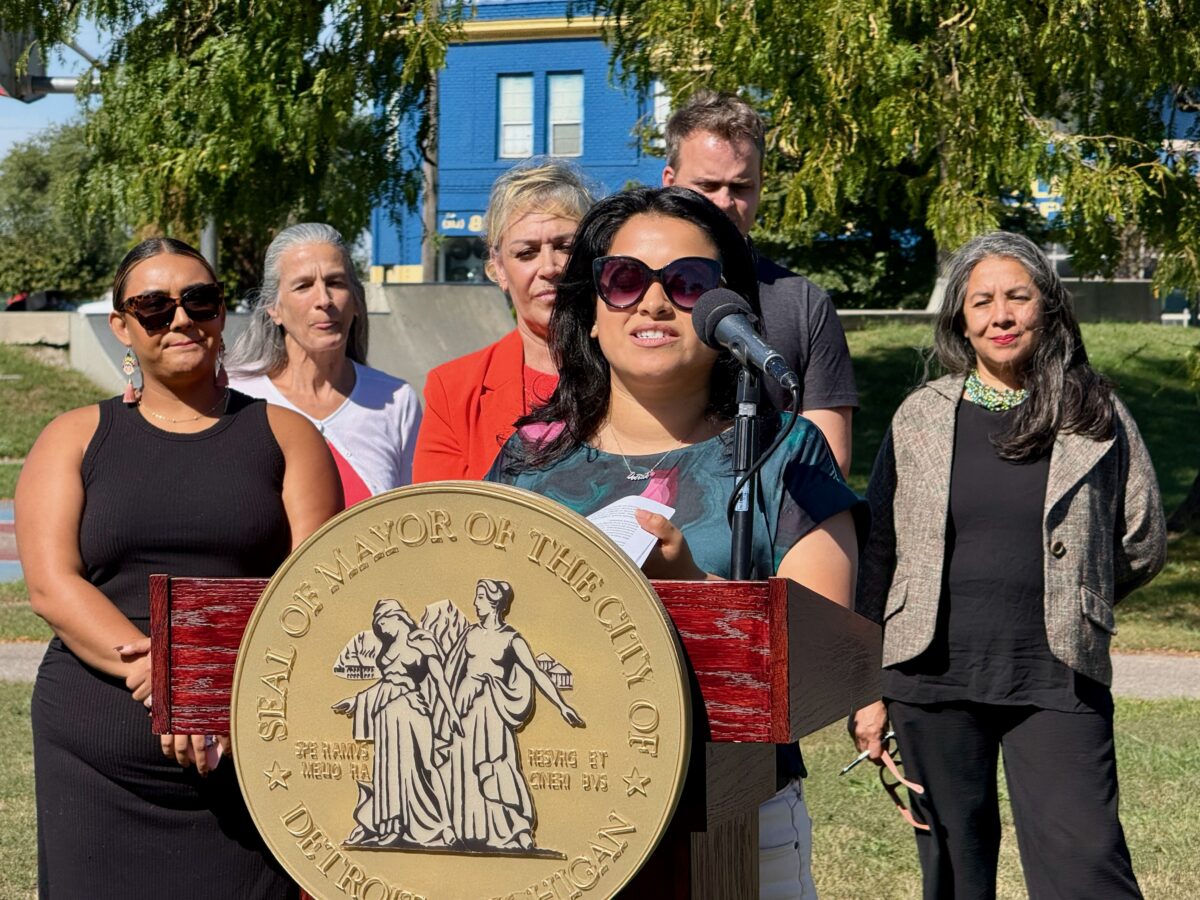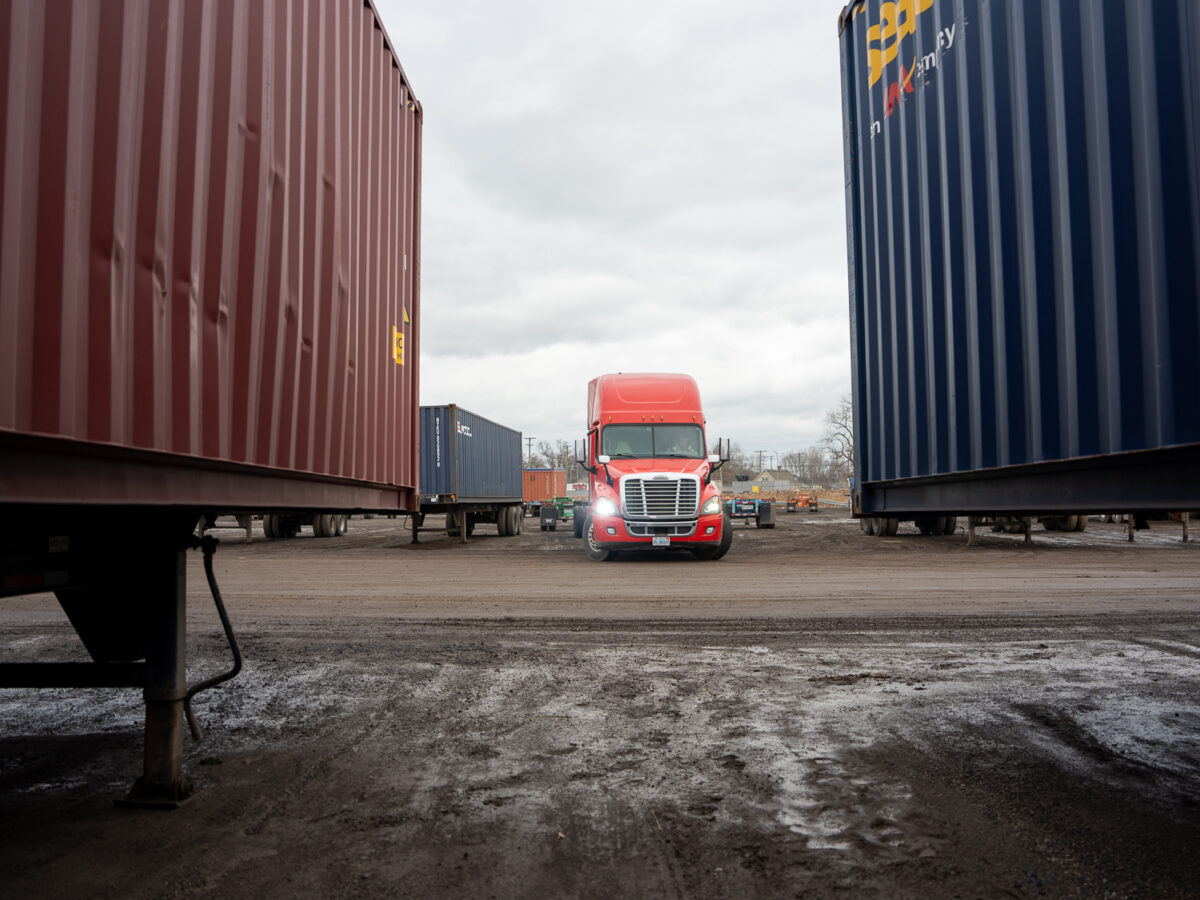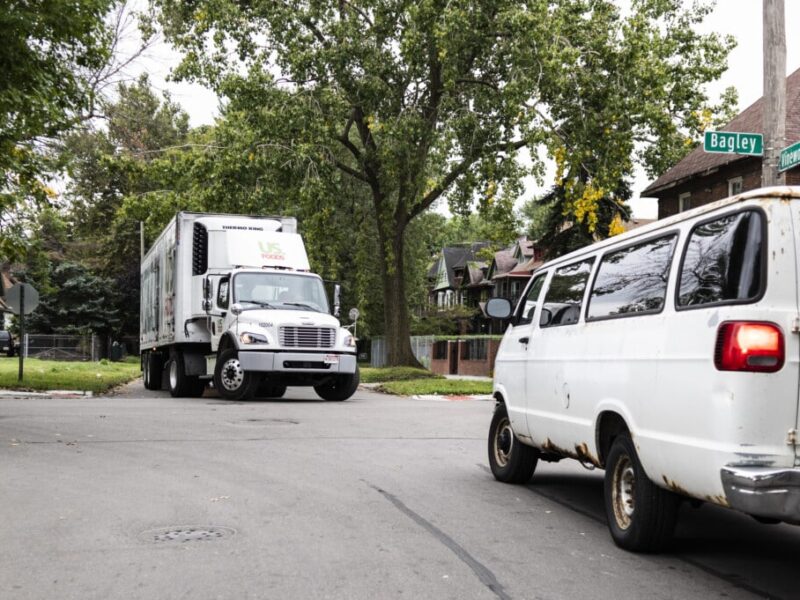Overview:
- New restrictions and routes on truck traffic in Southwest Detroit take effect Monday and will be enforced by police.
- Requests for help with truck traffic from neighborhood residents date to the 1930s.
- City Councilmember Gabriela Santiago-Romero says she will work to revise city ordinances to strengthen trucking regulations, impose stricter fines.
Southwest Detroit residents, who have petitioned since 1938 for trucks off their streets, could see improvements in quality of life in less than a week.
Starting Monday, Oct. 6, truck traffic is prohibited or limited in many key corridors to reduce the impact on residents and small businesses.
Local business deliveries will maintain access, and restrictions will be enforced by police, city officials announced Wednesday at a press conference in Boyer Park.
Residents have had to “tolerate noise, dust and safety challenges of trucks driving down their streets at all hours of day and often during the night,” said Sam Krassenstein, deputy director at Detroit’s Department of Public Works and chief of infrastructure.
“Trucks have been using many of the streets in Southwest Detroit as a cut-through to access the freeway because it’s the quickest way and frankly, we’ve been letting them,” he said.
The plan restricts truck traffic on all residential streets and certain roads like Livernois, Dragoon, Clark, Scotten, and West Grand Boulevard. It permits limited local deliveries on commercial corridors such as West Vernor and Springwells, and designates John Kronk, Dix, Michigan, part of Livernois, Fort, the I-75 service drive, Wyoming, and Miller as approved truck routes.
The restrictions will be accompanied by traffic enforcement and education.
Raquel Garcia, executive director of Southwest Detroit Environmental Vision, said she is “beyond thrilled” about the announcement.
“Who are we in Southwest Detroit when we don’t spend 90% of our energy fighting,” Garcia said. “Fighting to breathe, fighting because there’s trucks rumbling down our streets at 11 o’clock at night or five o’clock in the morning.”
City could revise ordinances, expand truck enforcement to additional neighborhoods
While the routes take effect Monday, City Councilmember Gabriela Santiago-Romero said she will work with the city law department to formally revise the city’s ordinances to strengthen trucking regulations and impose a stricter fine structure to incentivize companies and their drivers to follow city law.
“We need to make these ordinance changes this year,” said Santiago-Romero, who represents Southwest Detroit.
Thomas Rogers, communications and engagement manager for Santiago-Romero’s office, said the truck routes and restrictions going into effect Monday will be newly enforced as part of the existing codes.
Krassenstein said the truck restrictions could be applied to other parts of the city.
“We know the issue is the most severe here, so let’s see how it works, what kind of response we get from industry, and what kind of compliance,” he said. “As we get our enforcement piece strengthened even more, we’ll start to look at those other areas.”
When asked whether the city should have acted sooner, Krassenstein said the city wanted to “have all of our ducks in a row” to minimize unintended consequences.
“What we didn’t want to do was just respond to the loudest voice in the room and say, yeah, we’re just going to put up a no truck sign, you know, let’s say on Livernois, and not deal with any of those streets,” he said.
“So the consequence of that would have been … they just go to the next street.”
How Southwest Detroit truck restrictions will be enforced
The route restrictions will be enforced by police through multiple methods, said Franklin Hayes, the city’s assistant chief of police.
Noncompliant truck drivers and their employers will receive driver and commercial operator company citations, respectively, Hayes said.
If a company or driver incur multiple violations, the city can “go after” their commercial driver’s license, which will prohibit them from operating commercial vehicles, Hayes said.
“It’s a serious violation, It’s much more than a parking ticket,” he said.
Once a system is launched on the city’s website, residents will be able to report noncompliant trucks, Hayes said.
Krassenstein said the city does not yet have a hotline, and said residents can reach out to their neighborhood police officers for enforcement.
MORE PLANET DETROIT TRUCK TRAFFIC COVERAGE
Detroit’s truck route ordinance: Will it finally bring relief to Southwest?
The City of Detroit aims to enact a truck route ordinance, addressing long-standing pollution and traffic issues in residential areas by designating specific routes for trucks.
Detroit officials to unveil truck route ordinance
Detroit officials advance a long-awaited ordinance to divert freight trucks from residential streets in Southwest Detroit, with enforcement, education and infrastructure changes set for summer.
$112 million project promises cleaner air, less truck traffic in southwest Detroit
The Detroit Intermodal Freight Terminal will spend $112 million to modernize and decarbonize, reducing truck traffic and air pollution. However, residents and advocates question if the changes will address community concerns or just expand the terminal’s capacity at their expense.
Southwest Detroit’s longstanding truck problem
Every day, tens of thousands of semi-trucks cross the Ambassador Bridge and wind through Detroit neighborhoods to busy intermodal facilities. Trucks travel on roads that children cross to get to school, and shake the homes of residents.
Diesel exhaust exposure can lead to or worsen serious health conditions such as asthma, respiratory illnesses, and heart and lung disease, particularly in children and older adults, according to the Environmental Protection Agency. This can lead to more emergency room visits, hospitalizations, missed work and school, and premature deaths.
Noise pollution, particularly from truck traffic, is a major stressor. A 2021 University of Michigan study in Southwest Detroit showed residents are exposed to truck noise as high as 70 decibels, significantly above the EPA’s recommended 55 dB for residential areas, leading to health issues like high blood pressure, hearing loss, and sleep deprivation.
Southwest Detroit is home to more than a dozen major freight generators, including the Ambassador Bridge, Detroit Produce Terminal, and Oasis Trucking, according to last year’s city truck route study.
While many are near interstates, some facilities are located in or near residential areas. The Detroit Intermodal Freight Terminal, a major trade hub for rail, shipping, and trucking, clocks nearly 2,000 trucks daily at its Federal Street entrance, per a 2022 city study.
Detroit truck traffic reform on yearslong timeline
The goal of a truck route ordinance in the city is to reduce truck traffic and associated pollution in residential areas by establishing designated routes.
Former District 6 Councilmember Raquel Casteñeda-López worked on truck legislation, drawing from community activism and a 2021 Giffels Webster Engineering study. In 2021, residents said they were “fed up” and hoped for an ordinance by early 2022 — the end of Casteñeda-López’s term.
In 2022, residents asked the city to enforce existing traffic laws. In 2023, residents demanded a truck route ordinance and city officials told them to wait on another study. In 2024, the city collected resident input on the study and suggested recommendations for truck routes.
Augusta Gudeman, a freight specialist with the city’s Department of Public Works, said in February the city hoped to enact a truck route ordinance by this summer.
The Detroit streets affected by new truck routes

Trucks are banned from:
• Livernois and Dragoon between Vernor and the I-75 service drive.
• Clark between Toledo and the I-75 service drive.
• Scotten between Toledo and the I-75 service drive.
• West Grand Boulevard between Toledo and the I-75 service drive.
• Lonyo between St. John and Michigan Avenue.
• Central between Parkwood and Michigan Avenue.
• Toledo between Livernois and Clark.
• All streets between Vernor, the I-75 service drive, and Woodmere unless otherwise posted.
Five sections of streets are being categorized for local truck access and deliveries only:
• Central between John Kronk and Parkwood.
• Lonyo between John Kronk and St. John
• West Vernor between Woodmere and Dix
• West Vernor between I-75 service drive and Livernois
• Springwells between Vernor and I-75 service drive
Fort, Michigan, John Kronk, Dix, Livernois north of Vernor, the I-75 service drive, Wyoming, and Miller are approved truck routes.
🗳️ Civic next steps: How you can get involved
Why it matters
⚡ Residents of Southwest Detroit could finally get relief from truck traffic, emissions, and health-related consequences with an enforcement plan from the city going into effect Oct. 6.
Who’s making civic decisions
🏛️ The City of Detroit.
How to take civic action now
- ☎️ Call the Southwest Detroit Neighborhood Police Officer Sgt. Manuel Gutierrez at 313-596-5405 with truck traffic complaints.
- 📩 Email Sgt. Gutierrez at gutierrezm162@detroitmi.gov.
- 💻 Read the city’s website for contact information for the five additional neighborhood police officers covering the 4th Precinct.
- ✏️ Sign up for newsletter updates from Detroit’s Council District 6, which includes Southwest Detroit.
What to watch for next
🗓️ Detroit City Councilmember Gabriela Santiago-Romero said she aims to make amendments on truck traffic to city ordinances by the end of 2025.
⭐ Please let us know what action you took or if you have any additional questions. Please send a quick email to connect@planetdetroit.org.





